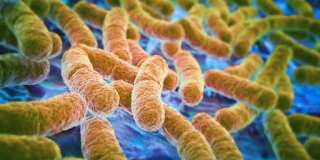Bacteria that live in and on human body are emerging as an increasingly important player in health and wellness. Human co-existence with these organisms is complex, minor changes in this relationship can leads to adverse reaction on human health.
Researchers from the University of Rochester Medical Center found that impairing a rare group of cells in the small intestine allows gut bacteria to invade the organ and cause major inflammation. The study was conducted in mice, but has implications for the treatment of inflammatory bowel disease (IBD), a group of disorders characterized by chronic inflammation in the digestive track.
Keeping guts in good shape requires the cooperation of multiple intestinal cells with the bacteria that live around them. Though small in number, intestinal cells called Paneth cells play an important role; they make antimicrobial compounds that keep bacteria in check and help form the lining of the small intestine, a physical barrier between the organ and the resident bacteria.
Previous research shows that changes or mutations in Paneth cells are associated with increased inflammation, including in individuals with Crohn’s disease, a type of IBD. But, scientists were unsure how Paneth cells opened the door to inflammatory damage.
Researchers led by Felix O. Yarovinsky, M.D. found the answer in a process called autophagy, which helps cells remove unwanted cellular material or debris. His team turned off autophagy in Paneth cells in mice and then exposed them to a stressor-a parasite called Toxoplasma gondii. Without autophagy, the barrier between the small intestine and the gut bacteria broke down; bacteria invaded the organ and caused severe infection and inflammation.
Paneth cells are like the guardians of the intestine and autophagy is like their armor, when their armor were removed, the Paneth cells couldn’t control the intestinal bacteria and it went wild, causing severe disease. The study suggests that normal autophagy in Paneth cells is required to regulate bacteria in the gut, keeping it at bay and preventing the gut bacteria from invading host tissue.
Paneth cells make up just 2 percent of the cells in the intestine, and the fact that restricting autophagy in these cells led to big problems was an unexpected result. Gut bacteria play a role in the development of IBD, which includes Crohn’s disease and ulcerative colitis. But how bacteria in the gut are controlled in these conditions remains elusive. This study and others point to Paneth cells as key regulators of the interactions between host and gut bacteria, and further research could inform the design of future therapies.
haleplushearty.blogspot.com


